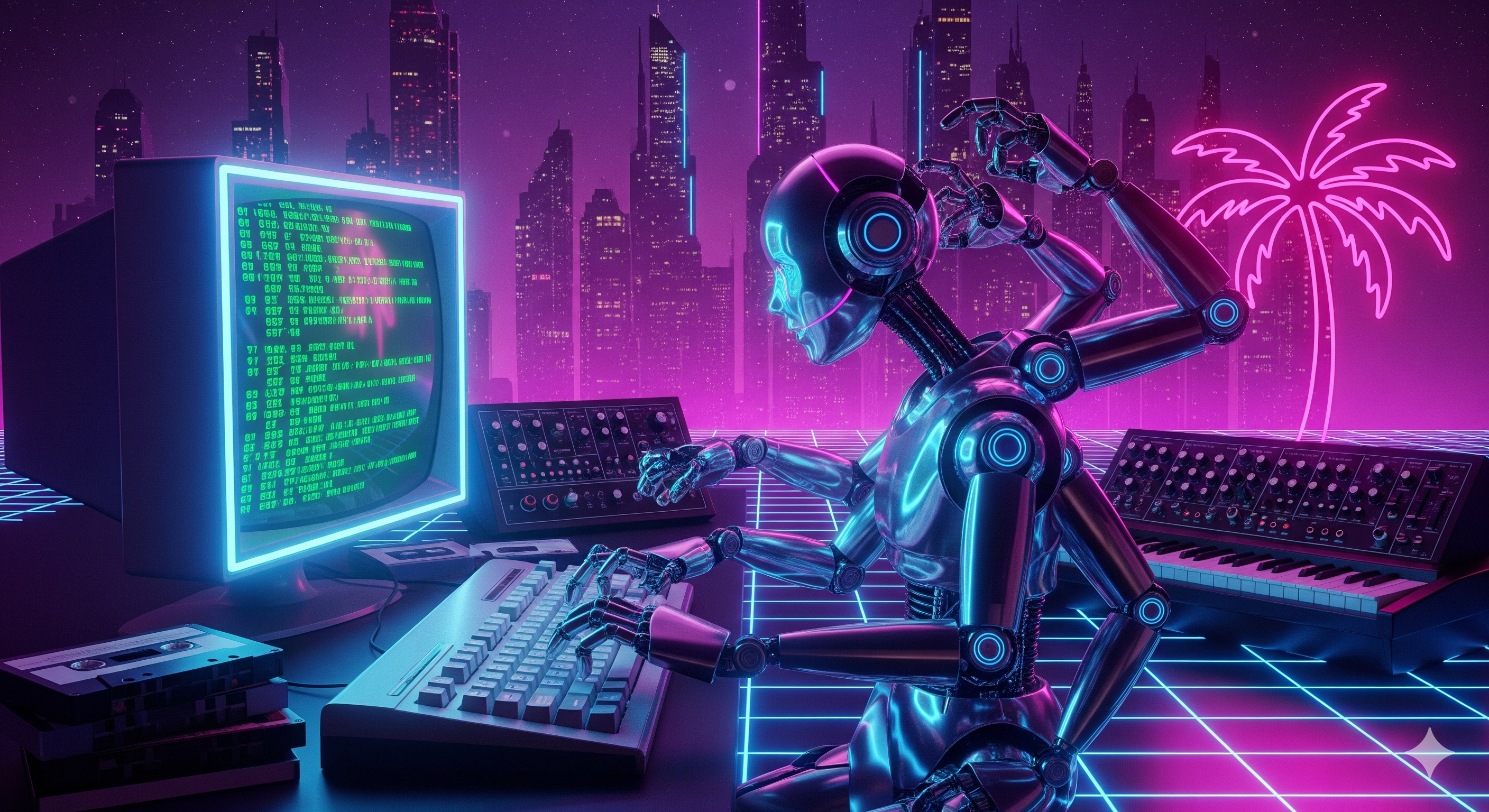A quick summary of a 3 important articles
The internet has evolved from a wild, unpredictable playground to a controlled landscape dominated by algorithms and AI, creating echo chambers that limit discovery and reinforce biases. This shift prioritizes engagement over diversity, diminishing the human touch in online experiences. To reclaim a more exciting digital life, users can adopt practical strategies to break free from these traps.
What follows is breakdown of a few different articles that have been published at WebDesignerDepot.com about AI and its impact on internet companies and the internet as a whole.
From Algorithmic Overlords to AI's Iron Grip: Reclaiming the Wild Web
In a world where your phone is basically an extension of your hand, the internet used to feel like an endless adventure—full of surprises, weird rabbit holes, and that random meme that made your day. But if you're a tech-savvy guy in your 20s or 30s, you've probably noticed it's starting to feel more like a scripted reality show. Algorithms are calling the shots, turning your feed into a predictable loop, and now AI is stepping in as the main character, reshaping how we build and experience the web. This post dives into the mess, drawing from insights across the digital landscape, and shows you how to fight back for a more exciting online life.
It's not just about losing the fun; it's about how these changes are influencing your daily scroll, from echo chambers that reinforce what you already know to AI tools that speed up creation but might strip away the human touch. We'll connect the dots between algorithmic control, AI's rapid rise in web design, and the web's shift from chaotic freedom to corporate dominance. By the end, you'll have practical tips to reclaim your digital freedom and keep things fresh. Let's break it down, because if you're into gadgets, memes, and online culture, this is your wake-up call.
The Algorithmic Trap: How Your Feed Turned into a Broken Record
Ever dive into TikTok or Instagram and realize you're just seeing more of the same stuff? It's giving "stuck in a rut" vibes, and that's no accident. Algorithms, those invisible puppeteers behind your screen, are designed to keep you hooked by predicting what you'll like based on your past behavior. Drawing from experts like UX specialist Alex Harper, this setup prioritizes engagement over genuine discovery, turning the web into a personalized echo chamber. It's low-key addictive, but it's also sucking the soul out of the internet we once loved.
The problem stems from the web's evolution, as highlighted in discussions about its shift from decentralized chaos to centralized control. Back in the '90s and early 2000s, the internet was a wild playground—think quirky personal blogs and unfiltered forums where you could stumble upon anything from retro gaming mods to niche debates. But as platforms like Google and Meta rose to power, they centralized everything for convenience, making navigation easier while quietly gatekeeping content. Now, algorithms amplify this by feeding you what keeps you scrolling, like an endless loop of viral gaming clips or influencer posts. Bold fact: Studies show users spend up to 50% more time on these feeds, but at the cost of diversity—reinforcing biases and blocking out fresh ideas.
To put it in perspective, imagine your favorite playlist on repeat; it's comforting at first, but eventually, you crave something new. The same goes for the web: algorithms track your clicks, likes, and even dwell time, creating a filter bubble that limits exposure to opposing views or unexpected discoveries. For tech
Why Algorithms Are Ruining Your Web Experience
How Algorithms Are Sucking the Fun Out of the Internet – Time to Reclaim Your Feed!
If you're a guy who's glued to your phone, endlessly scrolling through TikTok or Instagram, you know the drill: that satisfying "doom scroll" that starts with a funny meme and ends with you questioning your life choices. But low-key, it's not as fun as it used to be. The internet, once a wild playground for random discoveries and epic rabbit holes, has turned into a personalized prison curated by algorithms. These digital overlords are deciding what you see, think, and even feel, all while keeping you hooked for the ads. In this post, we'll dive into how this algorithmic takeover is messing with our online vibes and, more importantly, how you can fight back and rediscover the web's magic.
As a tech-savvy dude in your 20s or 30s, you probably live for the latest gadgets and viral trends, but let's get real – algorithms are straight-up gatekeeping the good stuff. They're not just recommending videos; they're shaping your worldview, reinforcing your biases, and turning the internet into a echo chamber of sameness. Stick around, and we'll break it all down, drawing from the frustration many of us feel when our feeds feel more predictable than your go-to takeout order. By the end, you'll have the tools to flip the script and make the web work for you again.
The Algorithmic Trap – Why Your Feed Feels Like a Broken Record
Ever notice how your Instagram Explore page is basically a highlight reel of stuff you've already liked? It's giving "predictable playlist" vibes, and that's no accident. Algorithms are designed to keep you engaged by serving up content based on your past behavior – that viral gaming clip you watched last night? Expect 10 more just like it. But here's the catch: while this might feel convenient at first, it's low-key ruining the thrill of the unknown.
According to experts in web design and user experience, like Alex Harper, a UX specialist with over eight years in the game, algorithms prioritize engagement over enrichment. That means platforms like YouTube or Twitter (sorry, X) are feeding you what keeps you scrolling, not what's actually good for your brain. Bold fact: Studies show that users spend up to 50% more time on algorithm-driven feeds, but at what cost? You're trapped in a filter bubble, where diverse ideas get filtered out, and you're left with the same influencers, memes, and opinions echoing back at you.
Think about it – when was the last time you stumbled upon a niche topic that blew your mind, like that deep-dive into retro gaming mods? Probably not recently, because algorithms are all about reinforcement, not revelation. They track your clicks, likes
AI by the Numbers: How It Took Over Web Design & Development in 2025
https://webdesignerdepot.com/ai-by-the-numbers-how-it-took-over-web-design-development-in-2025/
AI is Low-Key Taking Over Web Design and Dev in 2025 – You Won't Believe How Fast
If you're a tech-savvy guy in your 20s or 30s who's glued to the latest gadgets and memes, you've probably noticed AI popping up everywhere – from your phone's smart suggestions to those viral AI-generated art pieces. But here's the real deal: in 2025, AI isn't just a cool sidekick; it's the main character in web design and development. We're talking about tools that crank out code, whip up designs, and even handle the boring stuff so you can focus on the fun parts. Drawing from the latest industry insights, this post dives into how AI is flipping the script on how we build the web, backed by stats that show it's not just a trend – it's a full-on revolution.
Think about it: just a couple of years ago, AI was like that experimental filter on your social media app. Now, it's embedded in every step of the process, from brainstorming ideas to launching sites. We're seeing massive adoption rates, productivity boosts, and even a new "vibe coding" culture where developers describe what they want, and poof – AI makes it happen. In this post, we'll break it all down, connecting the dots between designers' workflows, developers' code battles, and the bigger picture from Big Tech. Stick around, because if you're into coding or design, this could be the edge you need to stay ahead in the game.
The AI Boom in Web Design: From Sketch to Screen
Let's kick things off with web design, where AI has gone from a nice-to-have to an absolute must. If you're a designer, you know the grind: staring at a blank canvas, tweaking layouts, and hunting for the perfect image. Well, AI is low-key handling a ton of that now, making your life easier and your output way more impressive. According to recent reports, nearly 93% of web designers are jumping on the AI bandwagon, up from just a few years ago when it was more of a novelty.
Here's a quick breakdown of how AI is shaking things up:
- Generating visuals and assets: About 58% of designers use AI for creating images, icons, and media. Tools like DALL-E or Midjourney let you input a simple prompt, and bam – you get pro-level graphics that save hours of manual work.
- Drafting designs: 51% rely on AI to mock up page layouts. It's like having a digital collaborator that iterates on ideas faster than you can say "refresh."
- Sparking creativity: Around 49% experiment with AI for fresh concepts, pushing boundaries into areas humans might not even think of. For instance, AI can suggest color schemes based on user data, making designs more personalized and effective.
But it's not just designers getting the perks – 67% of business owners now prefer AI-powered website builders over traditional hand-coding. Why? They're quicker, cheaper, and often more reliable for getting a site live. It's giving that seamless, futuristic vibe we all crave in 2025. However, this rapid adoption isn't without hitches. While clients are on board (55% support AI use), there's still a learning curve, and not everyone is sold on handing over creative control. Drawing from sources like Hostinger, this shift highlights how AI is bridging the gap between tech pros and everyday users, making web design accessible to more people than ever.
AI in Web Development: Code Like a Boss, But Watch Your Back
Now, let's flip to the dev side, where AI is acting as that reliable co-pilot every coder dreams of. 91% of developers are using AI for tasks like code generation, and it's changing how projects
Who Owns the Web Now? Centralization vs. Decentralization in the Age of AI
The Web's Wild Ride: From Chaotic Freedom to AI's Iron Grip
In the ever-evolving world of the internet, things have gone from a wild, anything-goes party to a tightly controlled VIP lounge—and now, AI is crashing the scene as the main character. If you're a tech-savvy guy in your 20s or 30s, you know the drill: we love scrolling through memes on Reddit or diving into the latest AI trends on Twitter, but have you stopped to think about who's really pulling the strings? The web is in the middle of a slow-motion identity crisis, shifting from a decentralized playground to a centralized empire, and it's all thanks to convenience, corporate power, and now, smart machines that generate our reality. Buckle up, because this ride is about to get real.
This isn't just tech history; it's a story that affects how you search for info, connect with friends, or even form opinions. Back in the early days, the web was like that unfiltered group chat with your buddies—no rules, just pure chaos and creativity. Fast forward to today, and AI is rewriting the script, making a few big players even more dominant. In this post, we'll break it all down, drawing from insights by UX expert Noah Davis, and explore why this matters to you. Let's dive in and see if we can reclaim some of that lost freedom.
The Golden Age of the Decentralized Web
Remember when the internet felt like a massive, uncharted wilderness? That's how it all started—back in the '90s and early 2000s, the web was a decentralized haven where anyone could throw up a website, link to cool stuff, and share ideas without asking permission. It was delightfully ugly, full of quirky personal blogs and forums that felt like hidden gems waiting to be discovered. No big corporations were gatekeeping; it was all about raw human curiosity and that DIY spirit.
But why was this era so appealing? For one, it fostered innovation and diversity. Think about it: platforms like early forums or even Usenet groups let users control their own content, creating a web that was as varied as your favorite playlist. As Noah Davis puts it, "It was a glorious mess... No gatekeepers. No paywalls." This setup encouraged experimentation, where tech enthusiasts could tinker without fear. However, it wasn't perfect—loading times were slow, and security was basically nonexistent, like leaving your front door wide open.
Fast-forward a bit, and this decentralized vibe started fading. The web's growth exposed its flaws: it was hard to navigate, prone to spam, and not user-friendly for the average person. That's where centralization crept in, promising to clean up the mess. In a low-key way, it made the internet more accessible, but at what cost? We'll get to that, but for now, picture the decentralized web as that epic LAN party from your college days—fun, but eventually, everyone wanted a more polished experience.
Why Centralization Took Over (and Why It's Low-Key Addictive)
Centralization didn't happen overnight; it was like a slow-building plot twist in a binge-worthy series. Big players like Google, Meta, and Amazon stepped in with shiny interfaces that made life easier. Suddenly, you could search the web in seconds, connect with friends on Facebook, or shop on Amazon without dealing with technical headaches. It's giving "convenience at all costs," and honestly, it's hard to blame us for falling for it.
The perks were undeniable: better security, seamless scalability, and a user experience that felt intuitive. As Davis notes, "It’s easier. One login. One account to rule them all." For tech-savvy folks like
SOURCES REFERENCED
- Why Algorithms Are Ruining Your Web Experience | Date: | Read Full Article
- AI by the Numbers: How It Took Over Web Design & Development in 2025 | Date: | Read Full Article
- Who Owns the Web Now? Centralization vs. Decentralization in the Age of AI | Date: | Read Full Article




Comments
No Comments Yet!
Would you like to be the first?
Comment Moderation is ON for this post. All comments must be approved before they will be visible.